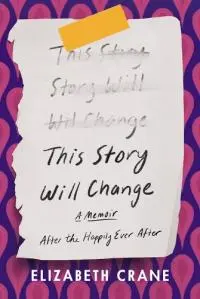Do we all want something better for ourselves, which feels like as good a question to ask oneself as any at this time of year?
Okay, maybe that isn’t something everyone wants.
How about, do I want better?
I supposed that depends on how you define better.
I’m thinking about this after reading the following line from one-time Chicago author Elizabeth Crane’s new memoir, This Story Will Change:
"I want this to be a story about everything just being better." (page 216)
In This Story Will Change, Crane explores the disintegration of her 15-year marriage. It's a marvel in terms of self-reflection, transparency, and per capita pain per sentence. Which could be overwhelming at times, but for a key fact, or maybe two key facts: despite the profound sadness and bewilderment permeating the work, it's still in Crane's distinctive voice, featuring her humor and dexterous word play, as well as her ability to cut through any excess verbiage to focus on the details that make life so preposterous and worth living all at once.
 In the first chapter alone, titled "Forever," Crane talks about her wedding and says:
In the first chapter alone, titled "Forever," Crane talks about her wedding and says:
"If anyone thought, Oh this is terrible idea, they forever held their peace. Many of them spoke as the spirit moved them to share why they celebrated this love... But who knows, maybe someone did hold their peace. Maybe they could ask. They would have to ask everyone. They've lost touch with some of them. Sometimes on purpose. Which is not a thing you want to have to say about people who were at your wedding." (page 3)
This riff continues, because that's what Crane does, she pursues ideas until everything feels absurd, and yes, funny, but sometimes sad as hell too, which is life—funny, absurd and sometimes sad as hell.
Joe Meno does something similar with Book of Extraordinary Tragedies. He writes of a South Side Chicago family of Eastern European descent that is full of damage—hearing loss, poverty, cancer, sick mothers and lost fathers—who are really just holding on for much of the book, yet full of love, curiosity and desire as well. As he always does, Meno brings a lot of sadness, a lot of humor, and something magical to all pages. The characters are rich, and their quirks are all so real, because in Meno’s hands they're not quirks, they're normal things. We may not all compose music in our heads as the protagonist Aleks does, but we all spend too much time in our heads—we’re all damaged, by family, life, and our bodies and minds abandoning us—and we're all obsessively composing something.
Meno knows this, it's just that he also knows pain and being an outsider, and the desire to connect with someone, anyone for any reason. As Meno writes:
"After that I walk outside and look at the interrupted bleakness of the snow. Everything is covered in a grim layer of frost. I hear a soft murmur, like a ghostly voice in a magnificently high C, and go in search of the sound. I walk a block and find two silver Mylar balloons stuck together on a power line. Something about the way the balloons move in the air is mesmerizing and, if I listen hard enough, I can hear them brushing against each other, creating a remarkable, almost silent friction. I stand there as long as I can until my hands get cold, seeing the tall buildings rising downtown to the east, looking like someone else's city." (page 47)
Like Crane, Meno's voice is distinct, you always know it's him, you can hear it and see it stretch across his, and Crane's, many fine books. There is also their mutual appreciation for the granular, how much knowledge can be found in the smallest, most quotidian observation, parts of our day and conversations.
Did Crane and her husband really grow more distant when they bought an L-shaped couch that allowed for more distance between them?
Maybe.
Either way, it can all feel so grim and beautiful all at once.
What is it with these Chicago writers?
Which in a way is the point, or part of the point, even as I note that Meno remains a fixture here and Crane is now in New York following a stop in Austin.
There was a time that I wanted something better. I wanted my story to be better.
This was a long time ago, but there I was one morning, wondering, why if my marriage was good, and work was good, I wasn't happy; why it felt like something was missing, and regardless, what was I going to do about it?
I decided I was going to write.
I didn't know any writers, I had never been to a reading, I didn't know anything about anything, so I did what I do, I started to write, and I started to figure out where the local writers were and what they were doing.
What I found among other things and other writers were Joe Meno and Elizabeth Crane.
First, it was their current books at the time, Hairstyles of the Damned and When the Messenger is Hot, respectfully, and the work was so vivid and electric it nearly vibrated. I couldn't shake it, and wouldn't have wanted to. Later I saw them read, met them, followed their careers, kept reading them. Inspired by them and their words, Chicago, I hustled, pitched, wrote, wrote more, failed, all of it, found my own career, voice, mostly, and never quite stopped.
What I did do though was at one point even as I never stopped writing, I stepped back from the immersion in all of it, the readings, the pursuit, the hustle, and I focused on writing and work, then the pandemic hit, things closed down, and no one could do things I wasn't necessarily doing anyway.
When the Printers Row Lit Fair was announced this year, however, I saw that Crane and Meno had events on the same day for their new books, because they just never stopped, neither of them.
 It took me back.
It took me back.
It was them, still doing what they do, still doing it better than most.
But now Crane was writing about a marriage that is no more and Meno was writing about a family trying not to disintegrate, because this is what comes with age, things change and fall apart, we change and fall apart. Everyone is older than they were, wiser maybe, and more damaged as well, or newly so, and trying to find the words to describe it.
In Crane and Meno’s case, such efforts are as vibrant and wonderful as they ever were, but both are farther along in their lives and careers, and their questions and stories reflect this.
When I saw them read and talk, both authors spoke to me, but in particular, when I attended Meno's event he spoke about the protagonist's hearing loss, and the character’s niece's as well, and how he drew on his own experience to write about it. I too have been losing my hearing. It's more recent and sudden then Meno’s experience, or maybe it isn't sudden, maybe I didn't realize it for a while, focused on other things as I was. I am losing it though, and I've been writing about it. This experience is no tragedy, but it is weird, and annoying, and while it’s mainly something I need to embrace and manage, there is a sort of suffering that comes with the missing of things, in conversation, in my relationships, including my marriage, and in the ephemeral scuzz that happens while being alive, such as car breaks or the pings of air conditioners, things I love.
I thought of this as I read the following from Meno:
“Who among us hasn’t been hurt? Who hasn’t been forced to give up on the thing they thought mattered or had their heart broken in some other way?” (page 63)
And this from Crane as well:
“Maybe everyone wonders what love is even after it goes away. Maybe there’s a period of time where heartbreak supersedes recognition of any other emotional component of an experience.” (page 222)
Maybe.
We all want there to be a better story, for ourselves, those we love, the character we read about and those we write about, and sometimes there is. The rest of the time, however, we keep writing, hustling, asking questions and seeking to make our words sing. Crane and Meno know this and do this as well as anyone I follow, and I’m grateful for that, for them and for their stories, which they’ve always been willing to share, and beautifully at that.
Get This Story Will Change at Bookshop or Amazon
Get Book of Extraordinary Tragedies at Bookshop or Amazon

About the author
Ben Tanzer is an Emmy-award winning coach, creative strategist, podcaster, writer, teacher and social worker who has been helping nonprofits, publishers, authors, small business and career changers tell their stories for 20 plus years. He is the author of the soon to be re-released short story collection Upstate and several award-winning books, including the science fiction novel Orphans and the essay collections Lost in Space: A Father's Journey There and Back Again and Be Cool - a memoir (sort of). He is also a lover of all things book, taco, Gin and street art.








